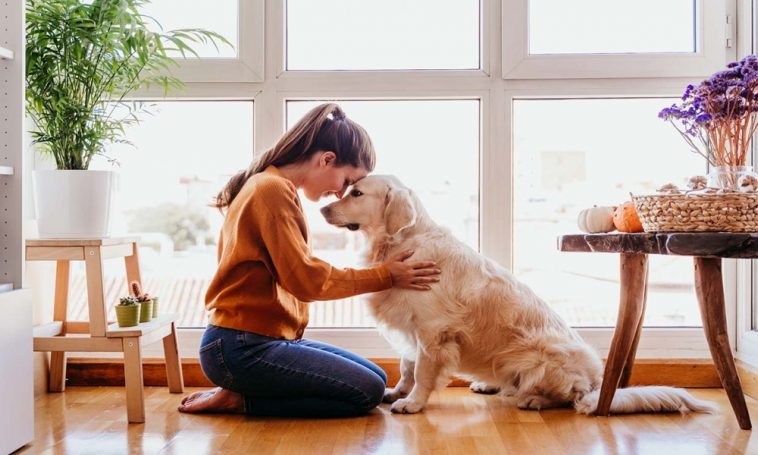If you suffer from anxiety, it could be a problem for your health
No one knows for sure what dogs feel when left home alone . However, although science has not yet devised a device that can encode the thoughts of dogs so that we can translate them into our language, we can interpret it.
And, of course, we very correctly intuit that these pets do not have a very good time when they are left alone . In fact, more than one furry would want to hang the ‘Stay at home’ sign and force us to stay with them, since they need to be in company.
What do dogs feel when they are left alone at home?
Dogs (and animals in general) are not capable of distinguishing time as such, they distinguish day from night, but not the concept of “time”. When we leave home they don’t know if it’s for a minute or forever. Generally, over time, they get used to us always coming home.
There are dogs that are more attached than others to the company of humans, and that manage being separated from them worse and not knowing when they will return. Which can cause them separation anxiety, which is a fairly frequent ethological (behavioral) consultation in the daily clinic. Anxiety causes dogs to suffer “nervous breakdowns” when their owners leave home and this can translate into urination and defecation anywhere (except puppies), vomiting, sialorrhea (excessive drooling), destruction in the house.
Is it normal for them to show this separation anxiety?
Feeling fear and restlessness can be normal, but when we talk about anxiety itself, it is something that the animal cannot control and that should be treated if it does not disappear in a reasonable time, since the animal suffers.
If an owner detects that his pet suffers from anxiety or believes that he may suffer from it, he should contact his veterinarian and consult him. Sometimes the “treatment” is simpler than in others, but you should always try to make that anxiety disappear, because it goes against the welfare of the animal.
Can we do anything to lessen your anxiety?
It depends a lot on each case and each animal, and the most important thing is to detect that there is a problem to be able to go to the vet and that they can help us. One very important thing, and one that is often overlooked, is that anxiety does not begin when we have already left the house, but rather before. Dogs are capable of understanding “anticipation signals”. They are things that we do unconsciously before leaving home (putting on our shoes, taking the keys, packing our bags, putting on our coats…).
When a dog has already detected these signals and we carry them out, his anxiety begins, increasing as he confirms that these signals do indeed indicate that we are going to leave. By the time we leave, the dog has been anxious for quite some time. Working on these signs of anticipation is usually a fundamental step to eliminate separation anxiety, for that it is convenient to observe what signs of anticipation we make, write them down, and do them at other times of the day where we are not going to leave the house. For example, putting on our shoes and sitting on the sofa. Making noise with the keys and not leaving the house, etc.
A partner can help you
On many occasions yes. As long as that other partner is to his liking, of course. This makes them feel less alone and helps ease separation anxiety in some cases.
For example, we can try to adopt another dog to keep him company or even try to get him used to living with a cat.
What behaviors are most alarming?
The damage to the house usually alarms the owner a lot, just like when the barking is so intense that the neighbors complain. Regarding the animal’s health, and understanding that any behavior caused by anxiety is bad, vomiting and self-mutilation are usually the most worrisome.
Vomiting because prolonged over time can cause chronic problems at the digestive level, and self-mutilation because the animal inflicts damage on itself (they can bite a limb non-stop, pull out hair, bite their tail until they are injured, etc.).
Are there tricks or games so we can help them stay calmer?
Yes. Working on the signs of anticipation is usually a key point and quite easy to do, although you have to be constant. There are also many “interactive” toys that can be filled with food that the dog takes a long time to get out of them, this sometimes helps them focus on something other than just that we are gone.
Working on visual signals when we leave and when we return can also be a measure to take, for example, tie a handkerchief at the door when we leave, and remove it immediately when we arrive. Although this measure must be worked on very carefully because it can become another sign of anticipation.



